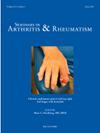Bruton's tyrosine kinase – A new target for immune mediated inflammatory diseases?
IF 4.6
2区 医学
Q1 RHEUMATOLOGY
引用次数: 0
Abstract
Bruton's tyrosine kinase (BTK) is a cytoplasmic protein that plays a key role in signalling pathways downstream of diverse surface receptors in B-cells and myeloid cells. These include the B-cell receptor itself, Fc receptors including FcεRI, toll-like receptors and chemokine receptors. Congenital deficiency of BTK causes X-linked agammaglobulinaemia because of B-cell developmental block, and BTK inhibitors (BTKi) are approved for the treatment of certain B-cell malignancies. They have also been studied in a variety of autoimmune and inflammatory diseases. In rheumatic conditions, results have been disappointing in rheumatoid arthritis (RA) and systemic lupus erythematosus but with some evidence for efficacy in Sjogren's syndrome. Data are more positive in multiple sclerosis, as well as in the cutaneous disease chronic spontaneous urticaria and possibly pemphigus vulgaris. BTKi may also find a role in severe allergic disease such as food allergy. First generation BTKi had a safety profile that included cardiotoxicity, hypertension, haemorrhage and rash. Second generation inhibitors have a more acceptable safety profile although dose-limiting toxicity is still observed in some conditions, including RA. Pharmacokinetic factors aside, the variable efficacy in different diseases is not fully explained but is likely to reflect disease dependence on different pathways in B-cells and myeloid cells and their relative sensitivity to BTKi.
布鲁顿酪氨酸激酶-免疫介导炎性疾病的新靶点?
布鲁顿酪氨酸激酶(Bruton's tyrosine kinase, BTK)是一种细胞质蛋白,在b细胞和髓细胞中多种表面受体下游的信号通路中起关键作用。这些包括b细胞受体本身,Fc受体包括Fcε ri, toll样受体和趋化因子受体。由于b细胞发育阻滞,先天性BTK缺乏症导致x连锁无球蛋白血症,BTK抑制剂(BTKi)被批准用于治疗某些b细胞恶性肿瘤。它们在多种自身免疫性疾病和炎症性疾病中也得到了研究。在风湿病方面,类风湿关节炎(RA)和系统性红斑狼疮的治疗结果令人失望,但有一些证据表明对干燥综合征有疗效。在多发性硬化症以及皮肤病慢性自发性荨麻疹和可能的寻常性天疱疮中,数据更为阳性。BTKi也可能在食物过敏等严重过敏性疾病中发挥作用。第一代BTKi的安全性包括心脏毒性、高血压、出血和皮疹。第二代抑制剂具有更可接受的安全性,尽管在某些情况下仍观察到剂量限制性毒性,包括RA。抛开药代动力学因素不谈,在不同疾病中的不同疗效尚未得到充分解释,但可能反映了b细胞和髓细胞对不同途径的疾病依赖性以及它们对BTKi的相对敏感性。
本文章由计算机程序翻译,如有差异,请以英文原文为准。
求助全文
约1分钟内获得全文
求助全文
来源期刊
CiteScore
9.20
自引率
4.00%
发文量
176
审稿时长
46 days
期刊介绍:
Seminars in Arthritis and Rheumatism provides access to the highest-quality clinical, therapeutic and translational research about arthritis, rheumatology and musculoskeletal disorders that affect the joints and connective tissue. Each bimonthly issue includes articles giving you the latest diagnostic criteria, consensus statements, systematic reviews and meta-analyses as well as clinical and translational research studies. Read this journal for the latest groundbreaking research and to gain insights from scientists and clinicians on the management and treatment of musculoskeletal and autoimmune rheumatologic diseases. The journal is of interest to rheumatologists, orthopedic surgeons, internal medicine physicians, immunologists and specialists in bone and mineral metabolism.

 求助内容:
求助内容: 应助结果提醒方式:
应助结果提醒方式:


